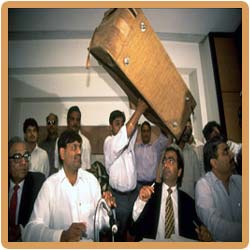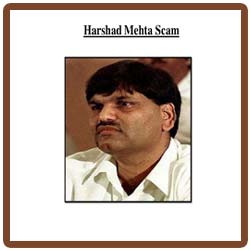FRAME OF THE SCAM
The name Harshad .M. Mehta was in the focus of public attention in the year 1992 with a number of financial crimes charged on him. Harshad Mehta was an Indian Stock broker who was purported for a huge stock deployed scheme bankrolled by insignificant bank receipts, which his company negotiated in ready forward transactions between banks. There were nearly 27 criminal charges filed against him.
Harshad Mehta born in 1954 grew up in Raipur and worked in the New India Assurance Company. But in the year 1980 he quit his job only to join the stockbroker P. Ambalal who was affiliated to the BSE. Later in 1981 Mehta worked as a sub broker for stockbrokers J.L. Shah and Nandalal Sheth. Once he gained enough experience Mehta along with his brother Sudhir came up with a new project in the name of Grow More Research and Asset Management Company Limited. Later Mehta's company seeked for the financial support of J.L. Shah and Nandalal Sheth when BSE offered for a sale of broker's card. Another name which was in the conversation of Harshad Mehta scam was Nimesh Shah who played a very safe game and however he is supposed to be a heavy player in the Indian stock market.
HARSHAD MEHTA AND STOCK EXCHANGE
Soon Harshad Mehta started buying shares in heavy numbers and soon his name became very well known in the Indian Stock market. The problem actually started when Mehta started buying the shares of Associated Cement Company (ACC) and increased the price of the shares from Rs.200 to Rs. 9000 (approx.) which according to the stock markets norm was a rise of about nearly 4400% rise in its price.Harshad Mehta was able to convince the reason behind the high level bidding as for the replacement cost theory which defines that the old companies can be marked or valued only based on the amount of money which is required to produce another similar company in par. This is called as the replacement cost theory. Mehta's firm also acted as a broker for what is generally assumed or believed to be as collateralized bank receipts which was not actually collateralized. These bank receipts were thus used in hot-term bank-to-bank lending, known as "ready forward" transactions. Soon people started calling him as the "Big Bull" as he paved way for the Big Bull run of the Stock Market. But the actual fact was Harshad Mehta used the advantages of the many loopholes in the banking system and evacuated off funds from inter-bank transactions.
DEATILED REPORT
As he was doing this he also apart from the ACC shares bought various other industrial shares at a heavy premium which led the sensex to rise subsequently. However this strategy of Harshad Mehta didn't hold good for a long time and was soon exposed so the banks started to demand their money back. This obviously led the sensex to dive back at the same rate at which it reached its peak. As a result of this there were lot charge sheets filed against him of nearly 72 criminal offences and 600 civil actions. Thus the scandal of Harshad Mehta came into public. Harshad Mehta was declared to be guilty of the criminal offence by the verdict of the Bombay High Court and Supreme Court of India for his part in a financial scandal valued at INR 4999 crores (US$830 million) which took place in the Bombay Stock Exchange (BSE).This in a way helped the Bombay Stock Exchange and SEBI to bring about new rules which helped to cover the ambiguity or the inadequacy in the law.
INVESTIGATION
This was very clearly explained by the veteran writer Sucheta Dalal in Times of India of how the scam got its shape by the ready forward (RF) deal. The RF is a fortified loan given from one bank to another for a very short period of time. In the normal case the bank lends against government securities where the bank which is borrowing gives away the securities to the lending bank at a very higher rate and get back the securities at the end loan period. In a ready forward deal the broker acts as a mediator to bring both the banks together and they get a commission for it and by no chance they handle either the cash or the securities. But this was not the curtain raiser in Mehta's case where his firm used the same RF deal and channelized money through the banks successfully. In Mehta's case both the securities and the money was transferred through the brokers where they acted as an intermediary who received the securities from the seller and handed them over to the buyer and he received the check from the buyer and subsequently made the payment to the seller.
UNDERTAKING THE TRANSACTIONS ON BEHALF OF A BANK
In this case the Mehta firm was very clever enough even in not enabling the buyer and the seller to know each other's identity. This was beautifully handled by the brokers as they were already the market makers and they were behaving to be undertaking the transactions on behalf of a bank to sustain a semblance of validity. Whereas Mehta used another tool which is the bank receipt (BR) which was given by the seller to the buyer establishing the sale of securities and a solemn promise to give the securities to the buyer. Thus in due course the securities are held in the seller's trust by the buyer. Harshad Mehta used this method where he located two banks namely the Bank of Karad (BOK), Mumbai and the Metropolitan Co-operative Bank (MCB) who were ready to give counterfeit bank receipts without any government securities.Using these fake bank receipts Mehta was able to borrow money from other banks thinking that they were lending it against government securities. Mehta used the money thus got in this way to elevate the prices of the share in stock market. The shares were then sold for significant profits and the BR retired when it was time to return the money to the bank.
SITUATION CAUSING TO FUNCTION A HUGE INCREASE IN THE PRICES OF STOCK
Harshad Mehta used this technique of exercising unscrupulous control over the situation causing to function a huge increase in the prices of stock. However many banks soon realized that they were holding fake BR's which was of no use at all but however by then Mehta was smart enough to scam the banks an amount of nearly Rs 4,000 crores. Once this scam was brought into light and taken to the Parliament, Harshad Mehta was immediately taken to prison. But however when this scam was exposed the chairman of Vijaya Bank committed suicide feeling culpable of having given lot of cheques to Mehta thereby holding responsible to the public money. Thus Mehta was charged with 72 criminal offences and more than 600 civil action suits against him and was arrested on these grounds on November 9th in 1992. His brothers were also arrested along with Mehta. The arrest warrant was issued based on the grounds of misappropriating more than 2.8 million shares (2.8 million) of about 90 companies, including ACC and Hindalco, through forged share transfer forms.
MEHTA CAME BACK AS A SHARE MARKET EXPERT BY PROVIDING TIPS ON INVESTMENTS

AFTER NINE YEARS OF DEATH OF HARSHAD MEHTA

Disclaimer:
This web page explains the scams that occurred in India.
The information are collected from the media reports.
www.indianmirror.com or it owners do not take any responsibility
for the authenticity of the contents.
Since some cases are in the court of law, we do not endorse any
cases or do not conclude on the same.If you need any changes to be done on the above information, kindly contact us with valid proof. However sincere attempt is being made to create awareness in the society against this evil and to prepare the younger generation for a corruption free India. |


